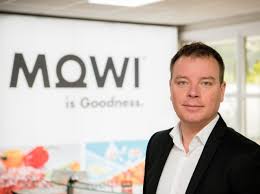Angler’s claim ‘20 years out of date\’ says Mowi boss

Mowi Scotland boss Ben Hadfield has dismissed anti-salmon farming claims by an angling lobby group as out of date and said it would be wrong to move salmon farms on to land.
Mowi revealed yesterday that it lost 73,600 salmon, with an average weight of 1.9kg, at its high energy site at Colonsay, in the wake of storm Brendan last week.
Hadfield told Radio 4’s Farming Today programme this morning that the fish escaped because one of the metal bars that held the pen in place was not connected properly and this resulted in the net tearing.
‘The equipment is the best we can buy and, yes, it is expensive,’ he said, adding that it exceeded both the Scottish and Norwegian technical standards and was quite new.
‘But this appears to be a manufacturing error that we’re investigating.’
However, Guy Linley-Adams, from Salmon and Trout Conservation Scotland, said it was ‘unrealistic’ to expect the technology to withstand everything that’s thrown at it at exposed sites like Colonsay and Mowi’s Hellisay, which lost 24,000 salmon, with an average weight of 4.5kg, last autumn.
He said sports fishermen were concerned about escaped farmed salmon breeding with wild fish and the preferred option of his organisation was land based farms, which would also cut transport costs.
‘Some of these sites, when they stock the juvenile fish into the cages, they actually helicopter them in; that cannot make sense.’
But Hadfield said Linley-Adams was ‘not connected enough’ to be able to recommend a relocation of farms to land.
‘He references using helicopters to stock smolts and that’s something that we did 20 years ago when I joined the industry and I haven’t seen it since then.’
Moving everything on land would be wrong because the fish would taste poorer, and the carbon footprint for farming fish on land is very high, said Hadfield.
‘We’re one of the most sustainable protein producers that people can choose from at the moment; we do that by using the marine environment in a sustainable way to produce a very high quality product.
‘Building huge on-land facilities and having them probably located in the main consumption areas, like the US or China, is not a move that salmon farmers in Scotland want to see happen any time soon.’
Hadfield also said that while it was ‘undesirable’ for farmed and wild salmon to breed, only a tiny percentage of escaped fish survive the ‘extreme predator pressure’.
‘They are just not tuned into predator avoidance like wild fish are and so the predation from seals and other predators in the marine environment is very high.’
Escapes have fallen massively in the industry, said Hadfield, but he acknowledged that one escape is too many and his company was sorry about the incident at Colonsay.
‘But we have had a very strong track record of operating in these exposed environments and reducing the frequency of escape events over the last few years.’

